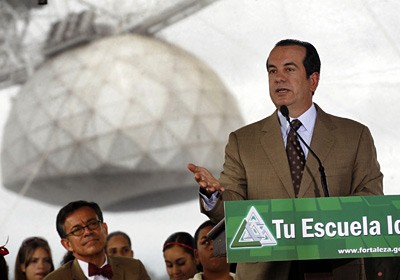Partnership agreement will bring $2.3 million annually to Arecibo Observatory for outreach, education
By Lauren Gold
Puerto Rico Gov. Anibal S. Acevedo Vilá and Robert Brown, director of the National Astronomy and Ionosphere Center (NAIC), signed a new partnership agreement April 14 to improve and enhance science, technology and engineering education for Puerto Rican schoolchildren at the Arecibo Observatory and the Angel Ramos Visitor Center.
Cornell manages Arecibo through the NAIC for the National Science Foundation (NSF).
The joint "Inspiration To Science" program is sponsored by the Puerto Rico Department of Education with funding of $2.3 million annually. That is good news for the observatory, which faces an uncertain future after recent budget cuts by the NSF.
Considering the precarious situation that Arecibo Observatory faces, said Acevedo Vilá in a statement issued in Spanish, the project is an opportunity to fulfill the educational and economic development goals of Puerto Rico's administration and to support this "most important ionospheric observatory in the world."
It also strengthens the connections between the observatory and the people of Puerto Rico, said Brown.
"For more than 40 years the Arecibo Observatory has been part of Puerto Rico, an icon recognizably identified with the island worldwide. With the agreement signed today the people of Puerto Rico become fully part of the Arecibo Observatory, cementing a new relationship that will also become a proud heritage of Puerto Rico," Brown said.
Through the program, nearly 50,000 K-12 students will visit the Angel Ramos Visitor Center annually, with more than half of the K-12 schools in Puerto Rico participating each year. The students will experience the process and elements of research science through side-by-side interaction with observatory scientists, as well as receive focused, hands-on instruction consistent with their science and technical academic curricula.
To staff the program, the observatory will hire two new teaching scientists, at least one aide and extra security support. All student costs, including transportation, materials, supplies and instructor fees will be provided by the Puerto Rico Department of Education.
Arecibo Observatory features the largest and most sensitive single-dish telescope in the world and internationally recognized research programs in astronomy, atmospheric science, planetary science and engineering. The observatory remains uniquely capable of establishing large-scale galactic structure, asteroid orbits and shapes, ionospheric composition and dynamics, and pulsar timing (for which a Nobel Prize was awarded), among other capabilities.
Media Contact
Get Cornell news delivered right to your inbox.
Subscribe